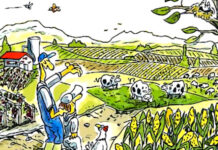On 8.3.22 FDA, the Food and Drug Administration, gave the go-ahead in the U.S. for the marketing of GMO beef that has undergone DNA alteration using the CRISPR-Cas9 technique (1,2).
This adds yet another variable in the American roulette of public health risks associated with beef lacking traceability on cloning, hormones and doping drugs, and animal meal in feed (3,4).
CRISPR-Cas9, genomic alterations in the wild
Intentional Gen omic Alterations( IGAs) made by CRISPR-Cas9 technique, as noted, have had extraordinary development in the US in recent years. (5) And European and Italian agricultural confederations-under the orders of the Big 4, the global pesticide and seed monopolists-have already convinced their respective governments to propose deregulation of new GMOs (6,7).
The aforementioned lobbies are now already instrumentalizing the ongoing international crisis to force institutions to allow both the import of GMO commodities not authorized in the EU and the simplification beyond all logic (1,2) of risk assessment on new GMOs. The naive farmers registered with Coldiretti et al. will thus find themselves increasing their dependence on agrochemicals with highly volatile price lists (8.9).
GMO cattle and GMO beef, the U.S. authorization
The Center for Veterinary Medicine (CVM) of the Food and Drug Administration (FDA) has evaluated the intentional genetic alterations made by the Crispr technique to the company Recombinetics’ GMO cattle as ‘low risk. As a result, FDA cleared the marketing of GMO beef derived from these animals without requiring prior approval of the genetic alteration made to them.
FDA thus radically simplified a permitting process that had taken numerous years, in the case of the giant, fast-growing GMO AA (AquAdvantage) salmon. (11) The simplified procedure has already been followed for the production of animals for medical use, such as the pig used for the first animal-to-human heart transplant. FDA thus expresses its discretion in applying one procedure over another.
The OGM ‘brilliant’ bull
The GMO bovine from Acceligen Inc (Recombinetics Group) is a Bos taurus PRLR-SLICK, literally ‘bright’. (11) It is characterized by a short, smooth coat that allows animals to bear the heat more easily. Cattle not stressed by heat can fatten more easily, thus increasing productivity expressed in kg of meat.
Genetic modification can be transmitted, through sperm and embryos, to produce-anywhere in the world-offspring with the same shorter coats. Given that gestation takes about nine months and calves could be slaughtered after about 10 months, GMO beef could reach the market within a couple of years.
No news in the label
Steven Solomon, director of FDA’s Center for Veterinary Medicine, explained that the agency’s risk assessment on Recombinetics GMO cattle took ‘several months’. And it ended favorably due to the fact that the alteration introduced into the DNA is not new to existing bovine genetics. Seeing no reason why the meat of animals or their offspring should be labeled differently.
Reactions of stakeholders
Stakeholder reactions have been milder than one might have imagined. Greg Jaffe, biotechnology specialist at the Center for Science in the Public Interest (CSPI), would settle for more transparency about ongoing procedures, from FDA, ‘So that people know what is in the pipeline. This could lead to better public acceptance and minimize any potential economic disruption from global trade as other countries may require GMO labeling‘. (12)
The Center for Food Safety, in the voice of Jaydee Hanson, has more reasonably noted that the agency should keep track of GMO animals and their offspring, over generations, to ensure that unforeseen problems do not occur. Just as should have been done and was not done in the case of cloning. It is worth adding, among the risks that could emerge-and have emerged in an earlier variety of GMO cattle, Recombinetics’ own antlerless bulls-that of antibiotic resistance. (13)
Interim conclusions
The ‘present future’ can only be observed, in its developments in markets without structured rules on short-, medium- and long-term risk analysis.
At the same time, there is an opportunity to secure traditional and typical genealogical lines of territories with innovative tools such as public blockchain. (14)
Dario Dongo
Notes
(1) Dario Dongo, Riccardo Clerici, Silvia Comunian. New GMOs, it is imperative to strengthen risk analysis. Science review. GIFT (Great Italian Food Trade). 14.6.20, https://www.greatitalianfoodtrade.it/sicurezza/nuovi-ogm-è-indispensabile-rafforzare-l-analisi-del-rischio-rassegna-scientifica
(2) NBT, the dark side of new editing techniques. Scientific Review. GIFT (Great Italian Food Trade). 6.3.21, https://www.greatitalianfoodtrade.it/sicurezza/nbt-il-lato-oscuro-delle-nuove-tecniche-di-editing-rassegna-scientifica
(3) Dario Dongo. Beef with hormones from Canada to the EU. CETA, what guarantees? GIFT (Great Italian Food Trade). 25.1.21, https://www.greatitalianfoodtrade.it/sicurezza/carni-bovine-con-ormoni-dal-canada-all-ue-ceta-quali-garanzie
(4) Dario Dongo. Mad cow in Canada. China, South Korea and the Philippines block imports. GIFT (Great Italian Food Trade). 24.1.22, https://www.greatitalianfoodtrade.it/sicurezza/mucca-pazza-in-canada-cina-corea-del-sud-e-filippine-bloccano-le-importazioni
(5) Dario Dongo. US, 45 thousand new GMOs a year out of control. GIFT (Great Italian Food Trade). 8.7.19, https://www.greatitalianfoodtrade.it/mercati/usa-45mila-nuovi-ogm-l-anno-fuori-controllo
(6) Dario Dongo. GMOs, the new advancing empire. GIFT (Great Italian Food Trade). 7/26/19, https://www.greatitalianfoodtrade.it/idee/ogm-il-nuovo-impero-che-avanza
(7) Marta Strinati, Dario Dongo. New GMOs, the 5 Star Movement dares the free-for-all blitz. The complaint of associations and civil society. GIFT (Great Italian Food Trade). 12/16/21, https://www.greatitalianfoodtrade.it/sicurezza/nuovi-ogm-il-movimento-5-stelle-azzarda-il-blitz-libera-tutti-la-denuncia-di-associazioni-e-società-civile
(8) Dario Dongo. New GMOs serving agrotoxics. Proof of 9 in Monsanto’s new GE corn. Petition. GIFT (Great Italian Food Trade).
4.7.20, https://www.greatitalianfoodtrade.it/consum-attori/nuovi-ogm-a-servizio-degli-agrotossici-la-prova-del-9-nel-nuovo-mais-ge-di-monsanto-petizione
(9) Dario Dongo. New GMOs, the big bluff. Égalité. 4.7.20, https://www.egalite.org/nuovi-ogm-il-grande-bluff/
(10) Intentional Genomic Alterations in Animals: Enforcement Discretion. FDA (Food and Drug Administration). Last accessed 24.3.22, https://www.fda.gov/animal-veterinary/animals-intentional-genomic-alterations/intentional-genomic-alterations-animals-enforcement-discretion
(11) Dario Dongo. GM salmon under consideration by the Food & Drug Administration. Food Fact. 7/24/10, https://ilfattoalimentare.it/il-salmone-gm-al-vaglio-della-food-drug-administration.html
(12) FDA. Risk Assessment Summary – V-006378 PRLR-SLICK capture. https://www.fda.gov/media/155706/download
(13) Jonathan Latham, Allison Wilson. FDA Finds Unexpected Antibiotic Resistance Genes in ‘Gene-Edited’ Dehorned Cattle. Independent Science News for Food and Agriculture. 12.8.19, https://www.independentsciencenews.org/news/fda-finds-unexpected-antibiotic-resistance-genes-in-gene-edited-dehorned-cattle/
(14) Dario Dongo. Blockchain agribusiness, from Walmart to FDA in the US, Wiise Chain in Italy. Toward Web 3. GIFT (Great Italian Food Trade). 9.2.22, https://www.greatitalianfoodtrade.it/idee/blockchain-agroalimentare-da-walmart-alla-fda-in-usa-wiise-chain-in-italia-verso-il-web-3
Dario Dongo, lawyer and journalist, PhD in international food law, founder of WIISE (FARE - GIFT - Food Times) and Égalité.








